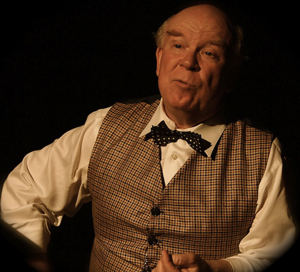
He was born to privilege in a time and a society where such accidents determined his future as surely as they restricted that of other citizens. He suffered devastating changes in fortune, distinguished himself in a wide range of endeavors and lived to the age of ninety. He was English, product of a culture Americans are fond of mythologizing (at a safe distance). So what inspired Ronald Keaton, a favorite Chicago-area character actor for several decades, to propose Winston Churchill as the subject for a solo show, appropriately titled Churchill?
"Though Churchill is mostly remembered as a Conservative, he didn't hesitate to cross over to the Liberal Party when it suited his agenda." Keaton declares, "Yes, he traced his lineage to the Duke of Marlborough, and he hated Socialism, and he believed in preserving the Commonwealth, but he also advocated assistance for the elderly and the needy—in fact, he created many of the programs that U.S. President Franklin Roosevelt implemented during his administration."
Ironically, our encounter with Churchill occurs in our own country, in 1946, where—having accepted an invitation from President Truman—he prepares for a speaking engagement at Westminster College in Fulton, Missouri. Only a year earlier, he had seen the end of a terrible war and his defeat for re-election by voters who saw in him a reminder of its cataclysmic destruction. As he reviews his prepared speech, he is unaware that, in describing a Russia grown increasingly threatening, an improvised remark will coin the term "Iron Curtain" for all posterity. How many Americans today can appreciate the significance of this moment in history?
"You'd be surprised!" Keaton assures me, citing previous short-run performances, where audiences frequently included multi-generational groups—grandparents who served under General Patton or sold war bonds, sons and daughters who studied the era in school, grandchildren curious as to what the hubbub was about. "Many times, they stay after the show and tell their stories," Keaton recalls, "It's a powerful experience, and to be a part of it is a rare privilege!"
Churchill was no romantic Anglo-Norman hero—indeed, photographs nowadays portray him as more of a W.C. Fields lookalike. Keaton reports little trouble arising from the contrast of his wiry Kentucky-Hoosier physique and weathered countenance with that of the rotund-faced Brit ("You'd be astonished at how many people tell me that I resemble Churchill!") Nor is he perturbed by the contradictions inherent in his persona's controversial personality.
"As much as I may disagree with Churchill's 19th century approach to life, what I admire about him was his overwhelming love of family and country, and his refusal to surrender when confronted by failure. This was a man who suffered from agonizing depressions, but joked about his having been born six weeks prematurely by claiming to have been 'over-punctual for [my] first appointment'. Like anything drawn from a chronicle spanning almost a hundred years, you pick and choose what you think your audience will understand. But his pain at making decisions, both as a military officer and as a government leader, that he felt were necessary, knowing that they would bring hardship upon his friends and allies—this is something with which we can all identify."
So what are we, in 2014, to take away from our chat with Churchill? "When his friends dwindled to a mere handful, when his very foundations were challenged, he always seemed to find a way to come back. I want to show a person who was intelligent, compassionate and witty—" Keaton drops his solemn tone to grin mischievously, "the kind of man you'd love to share conversation with in a saloon, but that you might not want for your banker."
Churchill opens at the Greenhouse on August 4 and runs through September 14.
Mary Shen Barnidge
Contributing Writer

 Follow Us On Twitter
Follow Us On Twitter